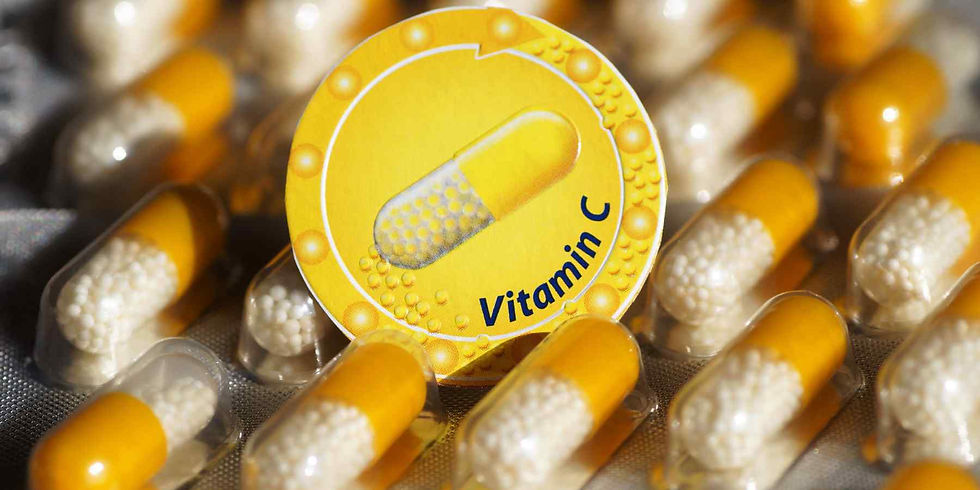Vitamin C and Immunity: The Science Behind the Connection
- Nasir Shaikh
- Feb 17, 2023
- 3 min read
Vitamin C, also known as ascorbic acid, has been a popular topic of discussion for years, especially in the context of its potential role in boosting immunity. This water-soluble nutrient is essential for human health and can be found in many fruits and vegetables, including oranges, strawberries, kiwis, and bell peppers. While it's well known that Vitamin C is important for overall health, its relationship with immunity is not as well understood. In this article, we'll explore the science behind Vitamin C and its potential impact on immunity.

How Does Vitamin C Boost Immunity?
Vitamin C is known to play an important role in the functioning of the immune system. It acts as an antioxidant, neutralizing harmful free radicals and preventing oxidative damage to cells. Additionally, it supports the production and function of white blood cells, which are responsible for fighting off infections and disease.
One of the key ways that Vitamin C boosts immunity is by enhancing the production and function of immune cells called phagocytes. Phagocytes are responsible for engulfing and destroying pathogens, such as bacteria and viruses. Vitamin C has been shown to increase the number of phagocytes in the bloodstream and improve their ability to engulf and destroy pathogens. This, in turn, may help to prevent or reduce the severity of infections.
Vitamin C also supports the production and function of lymphocytes, a type of white blood cell responsible for recognizing and responding to specific pathogens. Lymphocytes play a critical role in the adaptive immune response, which is the body's way of recognizing and responding to specific pathogens. Vitamin C has been shown to increase the number of lymphocytes in the bloodstream, which may help to improve the body's ability to respond to infections and prevent disease.
Finally, Vitamin C has been shown to have a direct antiviral effect. It has been shown to inhibit the replication of certain viruses, including the common cold virus and the herpes simplex virus. This direct antiviral effect may help to prevent or reduce the severity of viral infections.
Vitamin C Deficiency and Immunity

Vitamin C deficiency can have serious consequences for immunity. Low levels of Vitamin C can lead to a reduction in the number of phagocytes and lymphocytes in the bloodstream, which may impair the body's ability to respond to infections and prevent disease. Vitamin C deficiency has also been shown to impair the function of phagocytes, making it harder for the body to destroy pathogens.
In severe cases of Vitamin C deficiency, a condition known as scurvy can develop. Scurvy is characterized by a range of symptoms, including weakness, fatigue, muscle weakness, and joint and muscle pain. It can also lead to more serious health problems, such as anemia, gum disease, and impaired wound healing.
How Much Vitamin C Do You Need?

The recommended daily intake of Vitamin C varies depending on age, sex, and other factors. According to the National Institutes of Health (NIH), the recommended daily intake of Vitamin C for adults is 75-90 mg per day. For women who are pregnant or breastfeeding, the recommended daily intake is slightly higher, at 85-120 mg per day.
It's worth noting that the human body cannot produce Vitamin C on its own and must obtain it from food or supplements. Vitamin C is a water-soluble nutrient, which means that any excess is excreted from the body, so there's no risk of toxicity from consuming too much. However, it's still important to consume Vitamin C within the recommended daily intake to ensure optimal health.
Vitamin C-Rich Foods for Boosting Immunity

There are many Vitamin C-rich foods that can help boost immunity. Some of the best food sources of Vitamin C include:
Citrus fruits, such as oranges, grapefruits, and lemons
Berries, such as strawberries, blueberries, and cranberries
Kiwi fruit
Melons
Pineapple
Mangoes
Tomatoes
Bell peppers
Broccoli
Brussels sprouts
Eating a variety of Vitamin C-rich foods is important for boosting your immunity, but taking a high-quality Vitamin C supplement can help you ensure that you're getting enough of this essential nutrient. If you're looking for a convenient and effective way to supplement your diet with Vitamin C, consider the offerings from Fitaminat. Fitaminat offers a range of Vitamin C supplements that provide at least 1000 mg of Vitamin C per serving and are made from high quality, natural sources. By choosing one of these supplements, you can be confident that you're getting a potent and effective source of Vitamin C that can help support your immune system and improve your overall health.
Conclusion
Vitamin C is an essential nutrient that plays a key role in supporting immunity. By enhancing the production and function of immune cells, increasing the number of lymphocytes in the bloodstream, and having a direct antiviral effect, Vitamin C has the potential to prevent or reduce the severity of infections and improve overall health. To ensure that you're getting enough Vitamin C, eat a variety of Vitamin C-rich foods and consider taking a high-quality supplement.





Comments